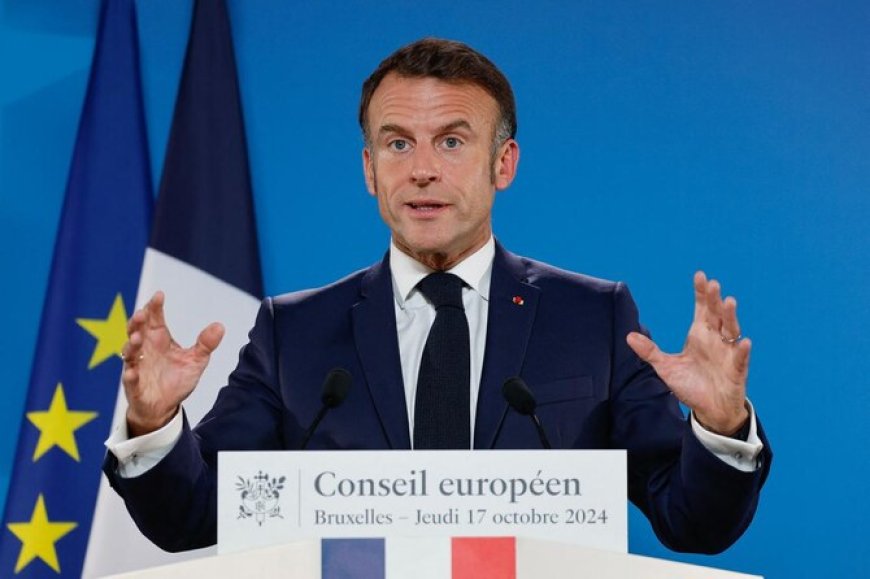Macron's annoyance with media raises more general questions about political fragility or press responsibility.

After words claimed to be attributed to him regarding Israel and the Middle East caused controversy, French President Emmanuel Macron has found himself caught in a furious argument with both local and international media. Comments expressed at a closed-door cabinet meeting set off a whirlwind of responses as Israeli Prime Minister Benjamin Netanyahu and well-known personalities in France accused Macron of rewriting history and displaying ignorance. Macron's later outburst during a press conference following an EU summit in Brussels begs more general issues regarding the function of the media, the presidency, and the direction of French foreign policy.
Comments attributed to Macron on Israel's duty to follow UN resolutions in its activities in Gaza and Lebanon were the core of the debate. Referring to the 1947 General Assembly resolution suggesting partitioning Palestine into Jewish and Arab governments, Macron apparently reminded ministers that Israel was formed by a UN vote. While the reaction in France was similarly quick, Senate President Gérard Larcher accused the French president of showing stupidity, the comments infuriated Netanyahu, who accused Macron of misrepresenting history.
During his Brussels news conference, clearly annoyed Macron attacked reporters, charging them of unprofessionalism and distortion of his remarks. He attributed misreporting and distortion of his comments out of context on the media. "I say enough about the situation in the Middle East not to need a ventriloquist," Macron added, annoyed with what he saw as careless coverage. He also aimed at ministers, exhorting them not to dissemin false information, and he demanded more prudence and respect of the guidelines controlling political communications.
Though fervent, Macron's outburst has spurred a more general conversation about his relationship with the media and his capacity to negotiate France's ever convoluted political terrain. Strongly reacting, the Association of the Presidential Press (APP) underlined the integrity of reporters and underlined that their employment is not only to replicate official announcements. The APP said, underlining the need of independent reporting, "the definition of journalism cannot be a presidential prerogative."
Critics of Macron have grabbed on the episode as proof of his growing isolation. The president finds himself progressively limited domestically as the result of last year's legislative elections' outcome and the appointment of a right-wing government compromising his political influence. Foreign policy has stayed one of the few places where Macron can exercise his power given limited space to move on the home front. His defenders contend that the criticism of his comments and the subsequent media frenzy are politically driven assaults meant to discredit France's voice in world events.
Arguing that the misrepresentation of his comments plays a "dangerous game" for France's foreign standing, pro-Macron legislators like as MP Mathieu Lefevre have gathered to defend him. Foreign policy is still a delicate topic in France, especially when it includes Israel and the Middle East, a territory where France has always aimed to act as a balancing agent. Defenders of Macron contend that his remarks show a dedication to multilateralism and international law, which France has historically supported.
But Macron's handling of the matter has also drawn criticism from members of civil society and opposition. Green MP Benjamin Lucas's scathing comments on X (previously Twitter), criticizing Macron of expecting reporters to "blindly reproduce" official statements, capture a deeper concern with how the president is seen to handle criticism and dissent. Critics contend that Macron's reaction exposes an underlying weakness since his political power declines and his tolerance of dissent gets thinner.
The show also begs more general issues on how leaders interact with the media in a time of quick reporting and fast-paced news cycles. Although given the sensitivity of the circumstances, Macron's annoyance may be reasonable, his forceful response emphasizes the conflict between political leaders and the media. Even if this results in awkward or divisive coverage, in a democratic society the media's job is to examine authority and hold authorities responsible.
For Macron, the debate over his comments on Israel reminds him that the space for error is becoming smaller even in spheres of influence he still controls. How Macron handles these dual challenges will be vital to his capacity to guide France ahead, both at home and on the international scene in a world where foreign diplomacy is entwined with domestic politics more than ever before. Though maybe a result of personal stress, his outburst against the media also highlights the larger difficulties he encounters as a leader negotiating a political terrain growing more fractured.













































